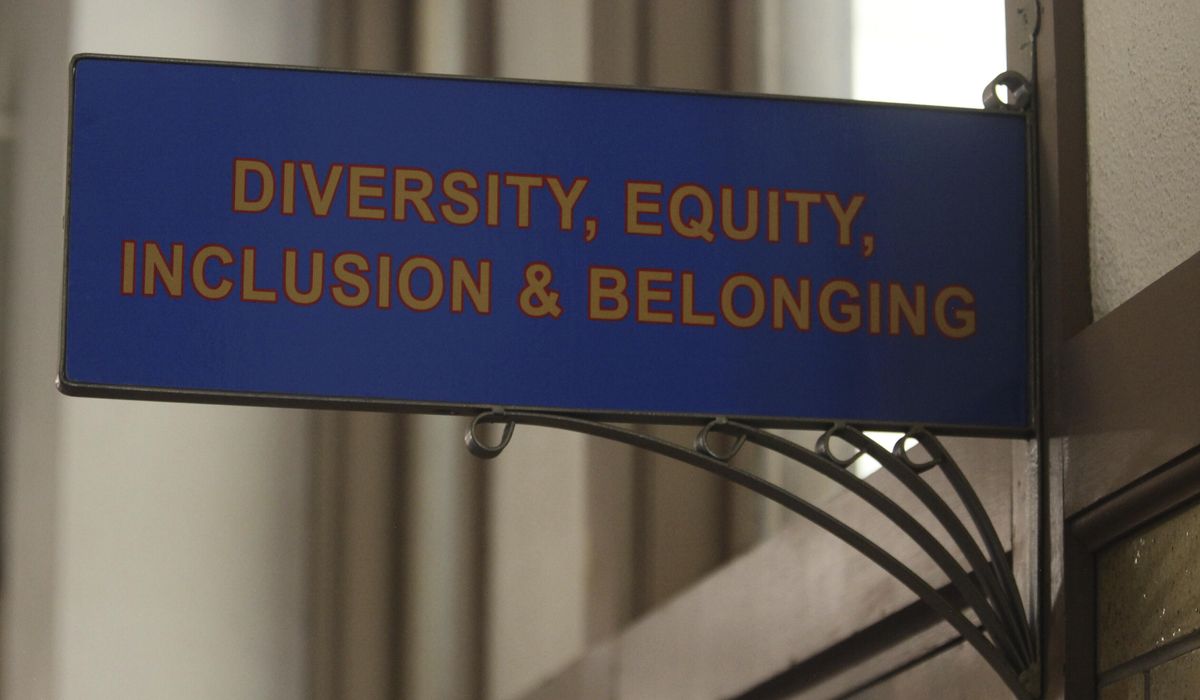


Half of professors at top colleges oppose mandatory faculty pledges to promote diversity, equity and inclusion despite a strong liberal in their departments, according to a recent survey.
The Foundation for Individual Rights and Expression conducted a three-month survey of 6,269 faculty members at 55 universities, including Harvard, Stanford, Ohio State and Texas A&M. It found that 50% said requiring academics to sign a written commitment to racial diversity as a condition of hiring was “never/rarely justifiable” and 52% said the same for promotion and tenure decisions.
Another 34% said it was “often/always justifiable” and 16% said it was “sometimes justifiable” to require such pledges for hiring — a policy colleges first adopted in the wake of Black Lives Matter racial justice protests in 2014.
Among tenured and non-tenured survey participants, 35% of self-described liberals joined 85% of conservatives and 59% of moderates to oppose DEI pledges for hiring.
“It should surprise no one that conservative faculty are opposed to mandatory DEI pledges, but even a substantial bloc of liberal faculty are opposed to the practice as well,” said Nathan Honeycutt, FIRE’s manager of polling and analytics. “Given how divisive they are, it’s likely these pledges persist in part due to self-censorship among faculty, who fear expressing opposition openly.”
Mr. Honeycutt said “very few” conservatives teach in universities.
In the survey, 71% of professors told the Philadelphia-based free speech group that a liberal would be a “very” or “somewhat” positive addition to their department, compared to 20% who said the same of a conservative.
The findings come as some colleges have moved away from DEI commitments over the past year, bolstering an ongoing debate about campus free speech.
The public University of Michigan announced this month that it would no longer solicit “diversity statements” in faculty hiring, promotions and tenure decisions, citing the findings of a faculty committee that such pledges threaten free speech and dissenting viewpoints.
Among 274 professors at the Ann Arbor campus who responded to the FIRE survey, 47% opposed DEI hiring pledges, 18% said they were “sometimes justifiable” and 35% supported them. The state flagship school has more than 8,000 faculty members.
“You cannot question DEI, cannot reason against DEI, or speak about anything related to DEI (unless you constantly virtue signal and support it unquestionably),” one anonymous University of Michigan professor wrote in the survey. “DEI is the McCarthyism of the current times.”
According to some academics interviewed by The Washington Times, the FIRE report confirms that political winds have shifted against DEI in faculty lounges.
“I think even scholars left-of-center see how the DEI statements can force people to conform their thought,” said Josh Blackman, a constitutional law professor at South Texas College of Law in Houston.
Others insisted the survey likely undercounted DEI proponents, noting that only 5.57% of 112,510 eligible professors participated.
They said Republican-led efforts to ban DEI training, offices and pledges in states such as Florida and Texas have forced many advocates of minority hiring initiatives underground.
“Some believe if they are too vocal that people can find out who they are and target them for reprisals, especially in a state like Florida,” said Omekongo Dibinga, a professor of intercultural communications affiliated with the Antiracist Research and Policy Center at American University. “No one wants to be a hashtag.”
Attorney Ilya Shapiro, a libertarian constitutional law scholar at the Manhattan Institute, said abandoning mandatory diversity pledges doesn’t stop hiring committees from requesting them.
“Faculties are self-reinforcing because departments hire their own members and there’s no external check on that,” Mr. Shapiro said. “They can still continue discriminating based on viewpoints and preventing, ironically, a diversity of thought.”
Mr. Shapiro resigned from Georgetown University Law Center in June 2022 after refusing to undergo racial sensitivity training over a January social media post predicting the Biden administration would nominate “a lesser Black woman” to the Supreme Court.
In the FIRE survey, 40% of 105 participating faculty at private Georgetown — which employs more than 3,000 professors — opposed DEI pledges in hiring. By comparison, 36% supported them and 24% said they were “sometimes justifiable.”
Nationwide, 87% of surveyed professors expressed difficulty having an “open and honest conversation” on campus about any hot-button political issue, with conservatives voicing the greatest fear of being “canceled” for their opinions.
Seven in 10 professors reported struggling to openly discuss the Israeli-Palestinian conflict. That increased to nearly 90% of respondents from Columbia, Stanford and Rutgers, where anti-Israeli student demonstrations surged over the past year.
The next-hardest issues they flagged were racial inequality (51%), transgender rights (49%), affirmative action (47%) and the recent presidential election (41%).
“There is nothing wrong with college professors waiting to be careful and precise about what they say on hot-button issues,” said Gail Heriot, a University of San Diego law professor and independent commissioner on the U.S. Commission on Civil Rights. “But what we’re seeing today seems quite unhealthy.”
Overall, two-thirds of respondents supported institutional neutrality on social and political issues at their schools.
Politically, 47% of conservative faculty reported feeling unable to voice their opinions because of how others might react, compared to 19% of liberal faculty.
Such findings confirm years of research showing liberal bias among faculty and students at elite universities, according to conservative campus activists.
“That this is happening at elite institutions of higher learning is even more alarming,” said Spencer Brown, chief communications officer at Young America’s Foundation, a network of conservative college students. “Colleges and universities ought to be the places where expression is the most unbridled.”
Another 14% of surveyed faculty members reported being disciplined or threatened with discipline for expressing unpopular opinions in their teaching, research, academic discussions or off-campus comments.
“Everything happens through gossip and collusion,” said one anonymous Columbia professor.
• Sean Salai can be reached at ssalai@washingtontimes.com.
